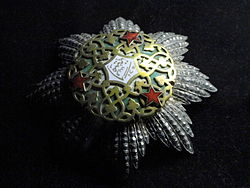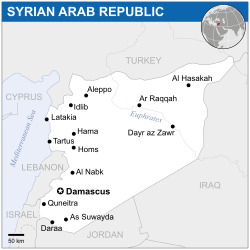Coat of arms of Syria (1980–2024)
This work meets one of the following conditions:
- Article 22 - "The author shall be entitled to his copyrights for his lifetime and fifty years thereafter. If the work is a combined effort of more than one author, then the copyrights are entitled for the lifetime and fifty years after the death of the last author party of the work."
- Article 23 - "The work published without mention of the author or with the mention of a pseudonym shall be entitled to the copyrights for fifty years as of the date of the first legitimate publication. If the identity of the author is revealed or doubts are no longer valid as for specifying the same before such period lapses, the copyrights shall be applied as per the provisions of Article 22 of the law herein."
- Article 24 - "Protection of audio - visual, broadcast, televised or cinematography work shall be enforceable for fifty years as of the date of producing the work."
- Article 25 - "Photographic, fine arts or plastic arts shall be enforceable for ten years as of the date of producing such work."
The official emblem of the Syrian Arab Republic. Its head is directed towards its left wing, and in the middle of its body is an Arab gear, with the official flag in the vertical position (in its right is a red color, in the middle is a white color, with two green stars in the middle facing upwards, and in its left is a black color) in addition to two ears of wheat symbolizing fertility and life. The eagle holds in its claws a ribbon inscribed in the Kufic script "Syrian Arab Republic". The eagle, the ribbon, and the two ears of wheat are golden, and the writing and the lines of the wings are light brown.
The logo was adopted by Law No. 37 issued on June 21, 1980, after its approval by the People’s Assembly on June 17, 1980, and published in the Official Gazette, issue No. 26 of 1980.Relevantní obrázky
Relevantní články
Státní znak SýrieStátní znak Sýrie je tvořen zlatým sokolem, hledícím heraldicky vlevo, jenž má na hrudi štít v národních barvách se třemi červenými, pěticípými hvězdami pod sebou. Pod štítem jsou dvě zlaté větévky. V pařátech sokol drží stříbrnou, zlatě lemovanou stuhu se zlatým, arabským opisem názvu státu الجمهوريّة العربيّة السّوريّة, al-Džumhúríja al-arabíja as-súríja. Zobrazení znaku je nejednotné a v detailech se liší. .. pokračovat ve čtení
Baasistická SýrieBaasistická Sýrie, oficiálním názvem Syrská arabská republika, je označení pro období Sýrie mezi lety 1963 a 2024, kdy byl stát pod totalitní vládou místní odnože strany Baas. Ta se chopila moci při státním převratu dne 8. března 1963, který byl veden alavitskými vojenskými důstojníky. Prezidentem se stal Saláh Džadíd, který byl roku 1970 svržen Háfizem al-Asadem. Odpor proti Assadově vládě vedl v roce 1982 k masakru v Hamá. Háfiz al-Asad zemřel v roce 2000 a jeho nástupcem se stal jeho syn Bašár. Protesty proti nadvládě strany Baas v roce 2011 během Arabského jara vedly k občanské válce, která oslabila územní kontrolu Asadova režimu. Několik let se baasistické vládě podařilo udržet se u moci a získat zpět území díky podpoře Ruska, Íránu a Hizballáhu. Po ofenzívě opozičních sil pak dne 8. prosince 2024 došlo ke svržení režimu a útěku posledního baasistického prezidenta Bašára al-Asada do exilu. .. pokračovat ve čtení
Řád UmajjovcůŘád Umajjovců je nejvyšší vyznamenání Syrské arabské republiky. Založen byl roku 1934 a udílen je ve třech třídách. .. pokračovat ve čtení
Řád za občanské zásluhy (Sýrie)Řád za občanské zásluhy arabsky:الاستحقاق المدني) je syrské státní vyznamenání založené roku 1953. Udílen je občanům Sýrie i cizím státním příslušníkům za službu státu. .. pokračovat ve čtení























